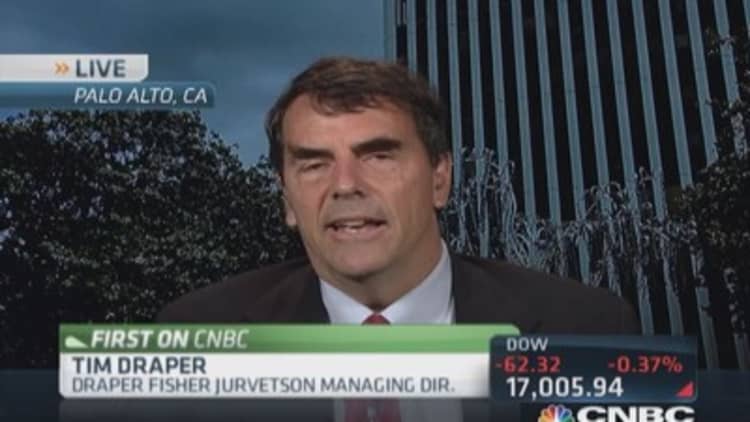Andrew Hemingway was introduced to bitcoin four years ago while working as a tech entrepreneur. At 32, he is now the Republican candidate for governor of New Hampshire—the youngest gubernatorial candidate in state history—and the first to accept bitcoin donations.
In May, a unanimous vote by the Federal Election Commission made it legal for bitcoin donations to be deposited into official campaign accounts. Donations are capped at $100 per person, per cycle.
"Every candidate has their base and their network ... I think by nature the currency trends significantly young and tech-savvy, so that's my base," Hemingway said. "My friends use bitcoin, their friends use bitcoin ... it's a part of a community."
About 20 percent of Hemingway's donations so far have come from bitcoins. If elected, he hopes to make New Hampshire the first state to accept bitcoin as payment for state taxes and fees.
"I would say certainly so far the earliest adopters in terms of candidates have been younger," Christopher David, CEO of bitcoin consulting company CoinVox, said of campaigns funded by the cryptocurrency.

Read MoreThis city could become the world's bitcoin capital
David says CoinVox has been approached by about 20 candidates who are seeking bitcoin funding in the coming election cycle.
Jared Polis represents the second congressional district of Colorado and is running for re-election to the House of Representatives this year. The description on his donation page reads, "I am proud to be one of the first members of Congress to promote personal financial freedom by accepting a digital currency for contributions."
Polis said his campaign was "eagerly awaiting" the FEC's decision on bitcoin donations in May. He has raised approximately $2,000 in bitcoins from more than 60 donors.
Christina Gagnier, Democratic candidate for the 35th congressional district in California, said her use of bitcoins has caught the attention of individuals who may not have been interested in her campaign otherwise.
"So far, it's not a huge percentage (of donations)," she said. "But I have engaged donors I haven't engaged before."
Read MoreTime for digital currencies to grow up
Bitcoin is converted into cash immediately upon donation to avoid volatility in the coin's value. It is created by online users who solve complicated mathematical puzzles and stored in digital "wallets."
Because this is the first election cycle in which virtual currency has been used, experts say there is no official data on how much bitcoin has been brought in during this election cycle so far.
"The $100 cap is an issue, and I wonder if the FEC will revisit that," Jerry Brito, a senior research fellow at the Mercatus Center at George Mason University, said. "I expect to see people maxing out that $100 donation."
Both PACs and individual candidates are taking advantage of the new rules on virtual currency. Just last week, the Republican Liberty Caucus hired CoinVox to push bitcoin funding for several libertarian candidates in the midterm elections.
Read MoreNY to issue 'BitLicense' for virtual currencies
Candidates in New Hampshire, Texas, California, Virginia, Georgia and Louisiana—just to name a few—have come out openly in support of bitcoin donations.
"The use is as much for candidates to show they favor technology," Jim Harper, global policy counsel for the Bitcoin Foundation, said. "The bitcoin demographic is younger, more tech-oriented, probably more male-heavy."
Harper said bitcoin donations are likely to increase as the coin's younger demographic becomes more politically engaged.
"Younger people aren't that active in politics in general, so as these people grow older, you may see more use," he said.
Both Harper and Brito agreed that while demographics vary, the push for virtual currency tends to come from libertarian-minded voters. For now, bitcoin donations probably don't have the power to change the outcome of an election.
Read MoreFight! Fight! A digital currency enters the ring
"It's a way to raise money, but not a blockbuster for any campaign," Harper added.
But would bitcoin be a viable source of funding for a presidential election in 2016? Absolutely, David said.
President Barack "Obama pioneered the $3 donation thing, and the microdonation concept is something bitcoin lends itself really well to," he said. "We're going get our act together in time to make some differences and make a statement in 2014 ... and be a real force in the 2016 election."
—By CNBC's Kelly Kaler





